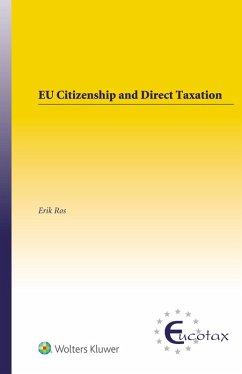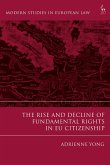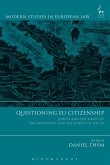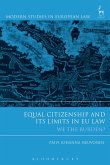Freedom of movement is a key principle of the European Union (EU) resulting in the right of every EU citizen to move and reside freely within the EU. Many EU citizens work in other Member States than their Member State of origin. Direct taxes are not as such covered in the treaties and therefore have much smaller bases for harmonization at EU level than indirect taxes. As a result, decisions of European Court of Justice (ECJ) on the clash between the EU principle of free movement and Member States' direct tax rules have a significant effect on national direct tax systems. This book focuses on the relation between free movement rights of EU citizens and the legal autonomy of Member States in the area of direct taxation and will immediately engage tax practitioners and scholars. The author asks (and answers) the question: Has the willingness at EU level to make EU citizenship a key driver behind the integration process come at the expense of national direct tax autonomy?The book's incomparably thorough analysis of the distinctive evolution, mainly via ECJ case law, of the relation between the EU principle of free movement of persons and Member States' direct tax rules includes in-depth discussion of the following elements and more:- the concept of EU citizenship in the EU's constitutional and institutional development; - how the ECJ has interpreted the concept of free movement with regard to economically inactive persons; - how the notion of EU citizenship has widened the ECJ's view on treaty access; - how the ECJ has addressed the clash between free movement of persons and direct taxation in the EU's constitutional context; and- numerous tax policy initiatives with regard to EU citizens before and after the Treaty of LisbonThis is the first book to investigate in such detail how the ECJ has tried to reconcile specific national direct tax rules with the general EU principle of free movement of persons from the perspective of EU citizenship. This book explains that the ECJ is in the process of reconceptualizing the market freedoms relating to the free movement of persons, also in the area of direct taxation, as part of a broader EU citizenship right for all economically active EU citizens to pursue an economic activity in a cross-border context; a right beyond the aim of realization of the internal market. As an extremely important analysis of the influence of EU law on the direct tax autonomy of Member States, this book is sure to be itself of great influence in the practice and study of taxation in the EU.
Dieser Download kann aus rechtlichen Gründen nur mit Rechnungsadresse in A, B, BG, CY, CZ, D, DK, EW, E, FIN, F, GR, HR, H, IRL, I, LT, L, LR, M, NL, PL, P, R, S, SLO, SK ausgeliefert werden.









